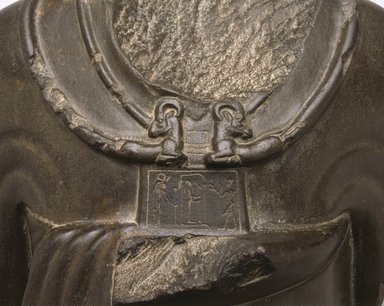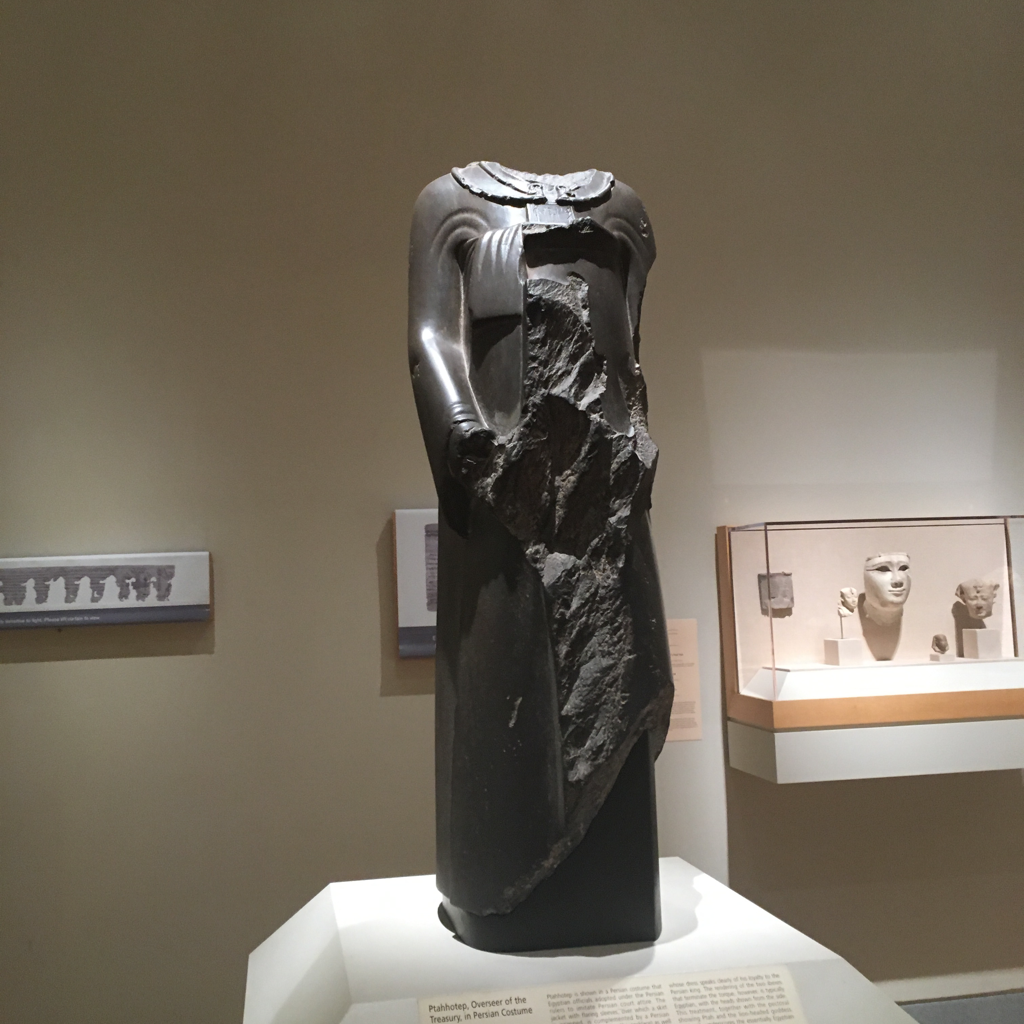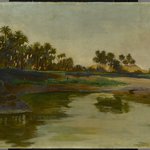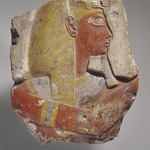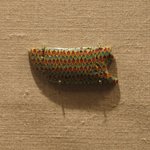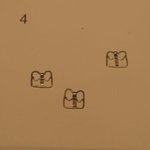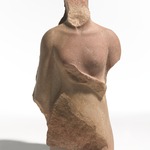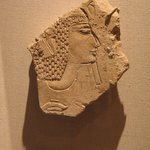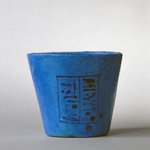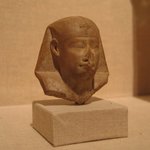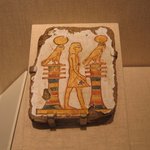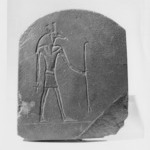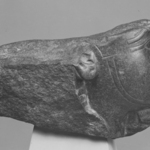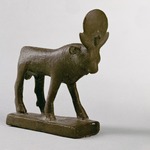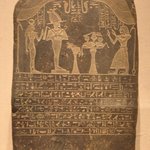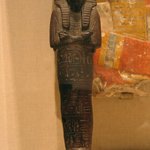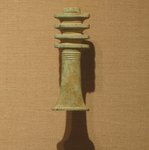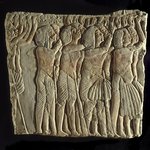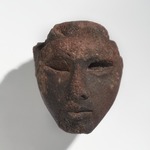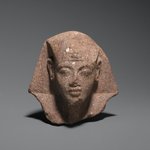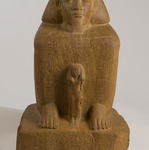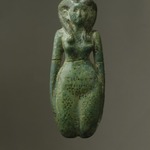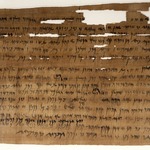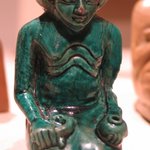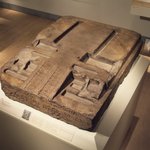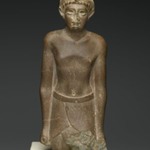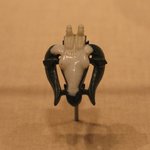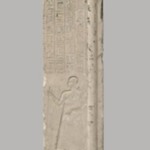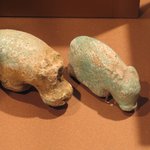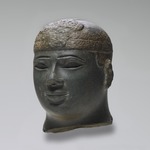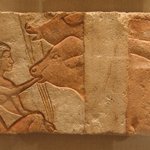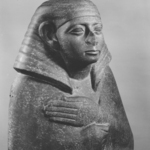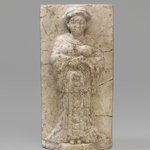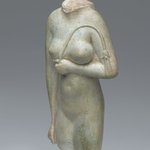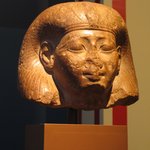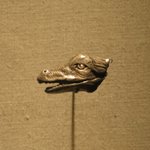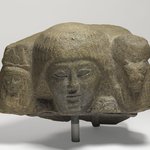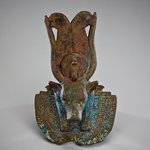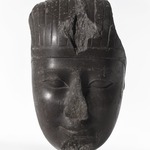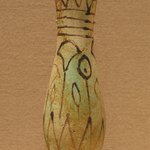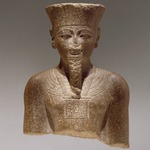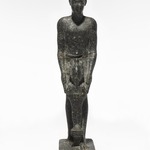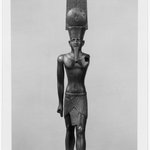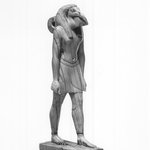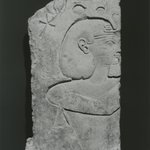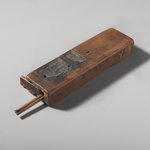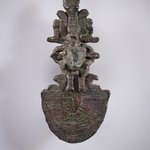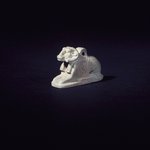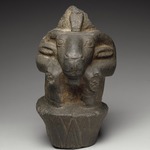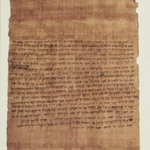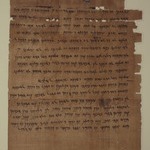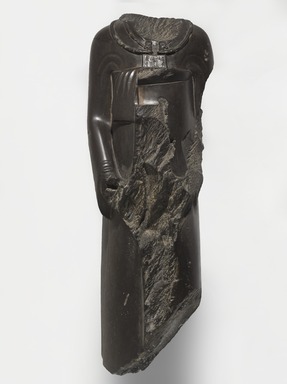

Overseer of the Treasury, Ptahhotep, 521–486 B.C.E. Quartzite, 35 × 12 × 13 in., 252 lb. (88.9 × 30.5 × 33 cm, 114.31kg). Brooklyn Museum, Charles Edwin Wilbour Fund, 37.353. Creative Commons-BY (Photo: , 37.353_PS9.jpg)
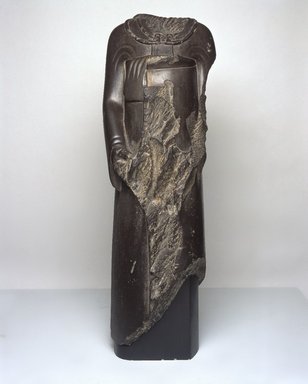
Overseer of the Treasury, Ptahhotep, 521–486 B.C.E. Quartzite, 35 × 12 × 13 in., 252 lb. (88.9 × 30.5 × 33 cm, 114.31kg). Brooklyn Museum, Charles Edwin Wilbour Fund, 37.353. Creative Commons-BY (Photo: Brooklyn Museum, 37.353_front_SL1.jpg)
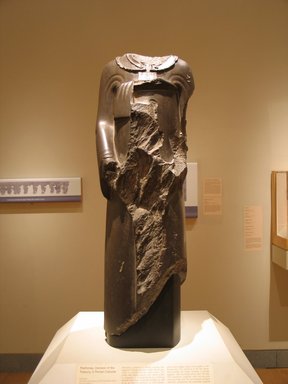
Overseer of the Treasury, Ptahhotep, 521–486 B.C.E. Quartzite, 35 × 12 × 13 in., 252 lb. (88.9 × 30.5 × 33 cm, 114.31kg). Brooklyn Museum, Charles Edwin Wilbour Fund, 37.353. Creative Commons-BY (Photo: Brooklyn Museum, CUR.37.353_wwg8_2015.jpg)
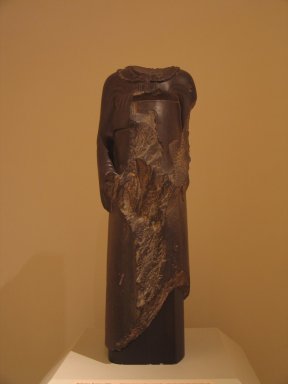
Overseer of the Treasury, Ptahhotep, 521–486 B.C.E. Quartzite, 35 × 12 × 13 in., 252 lb. (88.9 × 30.5 × 33 cm, 114.31kg). Brooklyn Museum, Charles Edwin Wilbour Fund, 37.353. Creative Commons-BY (Photo: Brooklyn Museum, CUR.37.353_wwg8.jpg)

Overseer of the Treasury, Ptahhotep, 521–486 B.C.E. Quartzite, 35 × 12 × 13 in., 252 lb. (88.9 × 30.5 × 33 cm, 114.31kg). Brooklyn Museum, Charles Edwin Wilbour Fund, 37.353. Creative Commons-BY (Photo: Brooklyn Museum, 37.353_bw_SL1.jpg)
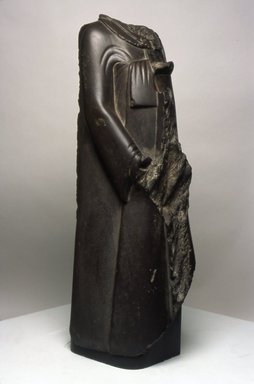
Overseer of the Treasury, Ptahhotep, 521–486 B.C.E. Quartzite, 35 × 12 × 13 in., 252 lb. (88.9 × 30.5 × 33 cm, 114.31kg). Brooklyn Museum, Charles Edwin Wilbour Fund, 37.353. Creative Commons-BY (Photo: Brooklyn Museum, 37.353_threequarter_front_right.jpg)
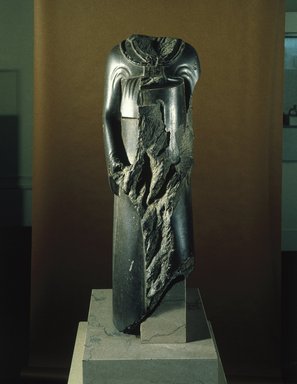
Overseer of the Treasury, Ptahhotep, 521–486 B.C.E. Quartzite, 35 × 12 × 13 in., 252 lb. (88.9 × 30.5 × 33 cm, 114.31kg). Brooklyn Museum, Charles Edwin Wilbour Fund, 37.353. Creative Commons-BY (Photo: Brooklyn Museum, 37.353_installation_SL1.jpg)
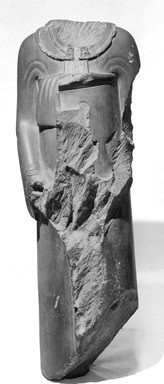
Overseer of the Treasury, Ptahhotep, 521–486 B.C.E. Quartzite, 35 × 12 × 13 in., 252 lb. (88.9 × 30.5 × 33 cm, 114.31kg). Brooklyn Museum, Charles Edwin Wilbour Fund, 37.353. Creative Commons-BY (Photo: Brooklyn Museum, CUR.37.353_NegD_print_bw.jpg)
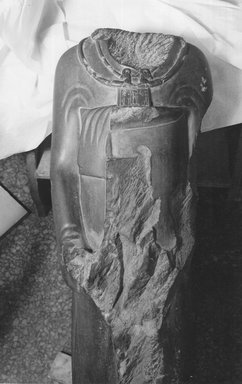
Overseer of the Treasury, Ptahhotep, 521–486 B.C.E. Quartzite, 35 × 12 × 13 in., 252 lb. (88.9 × 30.5 × 33 cm, 114.31kg). Brooklyn Museum, Charles Edwin Wilbour Fund, 37.353. Creative Commons-BY (Photo: Brooklyn Museum, CUR.37.353_Neg684_print_bw.jpg)
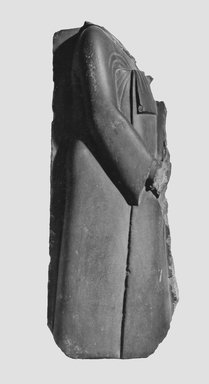
Overseer of the Treasury, Ptahhotep, 521–486 B.C.E. Quartzite, 35 × 12 × 13 in., 252 lb. (88.9 × 30.5 × 33 cm, 114.31kg). Brooklyn Museum, Charles Edwin Wilbour Fund, 37.353. Creative Commons-BY (Photo: Brooklyn Museum, CUR.37.353_NegA_print_bw.jpg)
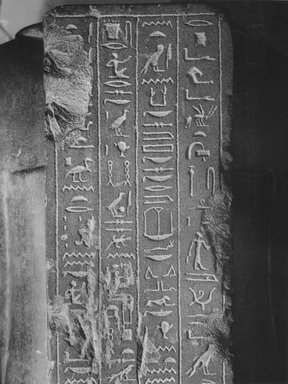
Overseer of the Treasury, Ptahhotep, 521–486 B.C.E. Quartzite, 35 × 12 × 13 in., 252 lb. (88.9 × 30.5 × 33 cm, 114.31kg). Brooklyn Museum, Charles Edwin Wilbour Fund, 37.353. Creative Commons-BY (Photo: Brooklyn Museum, CUR.37.353_NegCEG803_print_bw.jpg)
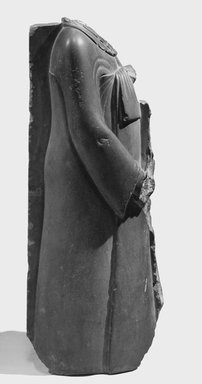
Overseer of the Treasury, Ptahhotep, 521–486 B.C.E. Quartzite, 35 × 12 × 13 in., 252 lb. (88.9 × 30.5 × 33 cm, 114.31kg). Brooklyn Museum, Charles Edwin Wilbour Fund, 37.353. Creative Commons-BY (Photo: Brooklyn Museum, CUR.37.353_NegE_print_bw.jpg)

Overseer of the Treasury, Ptahhotep, 521–486 B.C.E. Quartzite, 35 × 12 × 13 in., 252 lb. (88.9 × 30.5 × 33 cm, 114.31kg). Brooklyn Museum, Charles Edwin Wilbour Fund, 37.353. Creative Commons-BY (Photo: Brooklyn Museum, CUR.37.353_NegCEG685_print_bw.jpg)

Overseer of the Treasury, Ptahhotep, 521–486 B.C.E. Quartzite, 35 × 12 × 13 in., 252 lb. (88.9 × 30.5 × 33 cm, 114.31kg). Brooklyn Museum, Charles Edwin Wilbour Fund, 37.353. Creative Commons-BY (Photo: Brooklyn Museum, CUR.37.353_NegC_print_bw.jpg)
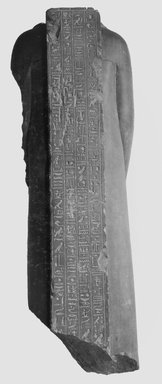
Overseer of the Treasury, Ptahhotep, 521–486 B.C.E. Quartzite, 35 × 12 × 13 in., 252 lb. (88.9 × 30.5 × 33 cm, 114.31kg). Brooklyn Museum, Charles Edwin Wilbour Fund, 37.353. Creative Commons-BY (Photo: Brooklyn Museum, CUR.37.353_NegB_print_bw.jpg)
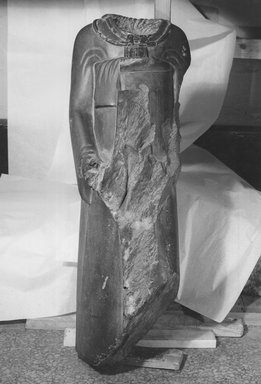
Overseer of the Treasury, Ptahhotep, 521–486 B.C.E. Quartzite, 35 × 12 × 13 in., 252 lb. (88.9 × 30.5 × 33 cm, 114.31kg). Brooklyn Museum, Charles Edwin Wilbour Fund, 37.353. Creative Commons-BY (Photo: Brooklyn Museum, CUR.37.353_NegCEG683_print_bw.jpg)

Overseer of the Treasury, Ptahhotep, 521–486 B.C.E. Quartzite, 35 × 12 × 13 in., 252 lb. (88.9 × 30.5 × 33 cm, 114.31kg). Brooklyn Museum, Charles Edwin Wilbour Fund, 37.353. Creative Commons-BY (Photo: Brooklyn Museum, CUR.37.353_NegCEG805_print_bw.jpg)
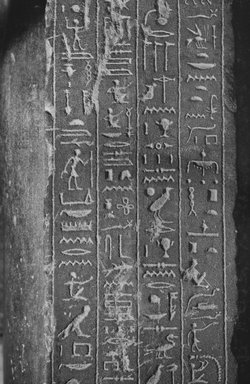
Overseer of the Treasury, Ptahhotep, 521–486 B.C.E. Quartzite, 35 × 12 × 13 in., 252 lb. (88.9 × 30.5 × 33 cm, 114.31kg). Brooklyn Museum, Charles Edwin Wilbour Fund, 37.353. Creative Commons-BY (Photo: Brooklyn Museum, CUR.37.353_NegCEG804_print_bw.jpg)
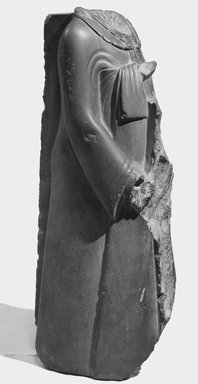
Overseer of the Treasury, Ptahhotep, 521–486 B.C.E. Quartzite, 35 × 12 × 13 in., 252 lb. (88.9 × 30.5 × 33 cm, 114.31kg). Brooklyn Museum, Charles Edwin Wilbour Fund, 37.353. Creative Commons-BY (Photo: Brooklyn Museum, CUR.37.353_NegF_print_bw.jpg)

Overseer of the Treasury, Ptahhotep, 521–486 B.C.E. Quartzite, 35 × 12 × 13 in., 252 lb. (88.9 × 30.5 × 33 cm, 114.31kg). Brooklyn Museum, Charles Edwin Wilbour Fund, 37.353. Creative Commons-BY (Photo: Brooklyn Museum, 37.353_back.jpg)
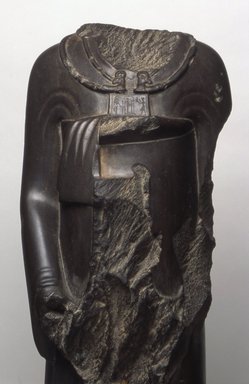
Overseer of the Treasury, Ptahhotep, 521–486 B.C.E. Quartzite, 35 × 12 × 13 in., 252 lb. (88.9 × 30.5 × 33 cm, 114.31kg). Brooklyn Museum, Charles Edwin Wilbour Fund, 37.353. Creative Commons-BY (Photo: Brooklyn Museum, 37.353_front_detail.jpg)
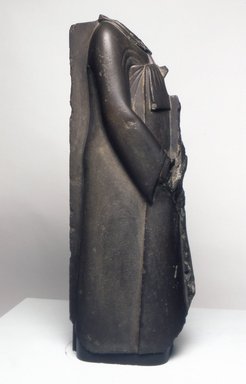
Overseer of the Treasury, Ptahhotep, 521–486 B.C.E. Quartzite, 35 × 12 × 13 in., 252 lb. (88.9 × 30.5 × 33 cm, 114.31kg). Brooklyn Museum, Charles Edwin Wilbour Fund, 37.353. Creative Commons-BY (Photo: Brooklyn Museum, 37.353_right_side.jpg)
Overseer of the Treasury, Ptahhotep
Egyptian, Classical, Ancient Near Eastern Art
On View: 19th Dynasty to Roman Period, Martha A. and Robert S. Rubin Gallery, 3rd Floor
Ptahhotep is shown in a Persian costume that Egyptian officials adopted under the Persian rulers to imitate Persian court attire. The jacket with flaring sleeves, over which a skirt is wrapped, is complemented by a Persian bracelet and torque (a bar-like necklace) as well as by an Egyptian pectoral, or chest plaque. These accessories give Ptahhotep the overall appearance of an Egypto-Persian official, one whose dress speaks clearly of his loyalty to the Persian king. The rendering of the two ibexes that terminate the torque, however, is typically Egyptian, with the heads shown from the side. This treatment, together with the pectoral showing Ptah and the lion-headed goddess Sakhmet, underscores the essentially Egyptian nature of the statue.
- Possible place made: Memphis, Egypt
- Possible place collected: Cairo, Egypt


